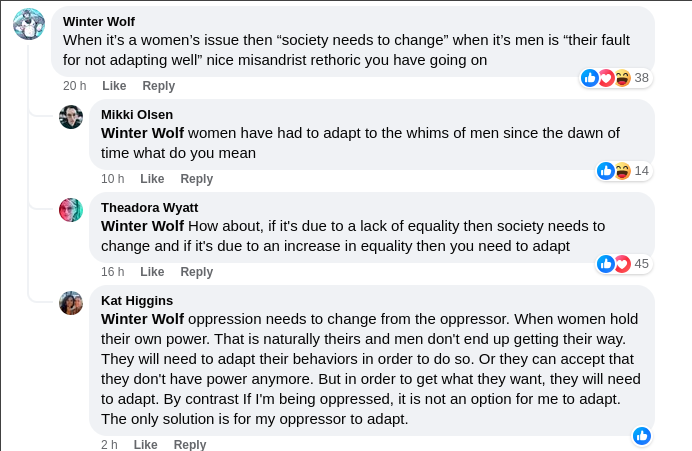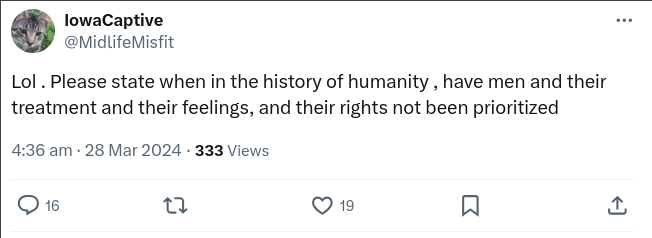Difference between revisions of "Feminist historical narrative"
| (35 intermediate revisions by the same user not shown) | |||
| Line 1: | Line 1: | ||
[[File:F03oUKZX0AEeiJh.jpeg|thumb|An example of the feminist historical narrative from a Christian song sheet.]] |
[[File:F03oUKZX0AEeiJh.jpeg|thumb|An example of the feminist historical narrative from a Christian song sheet.]] |
||
| − | The [[feminist historical narrative]] is an historical narrative widely believed by [[feminists]] and others. The feminist historical narrative is so pervasive that even many non- |
+ | The [[feminist historical narrative]] is an historical narrative widely believed by [[feminists]] and others. The feminist historical narrative is so pervasive that even many [[non-feminist]]s accept it. It is largely built of lies, half-truths and exagerations. The feminist historical narrative covers many areas. A few are presented here. |
== Ancient Matriarchy == |
== Ancient Matriarchy == |
||
| + | {{Ancient matriarchy}} |
||
| − | From the 1970s to the 1990s many feminists believed in an [[ancient matriarchy]]. This has been widely debunked and even most feminists now realise it never happened. |
||
== Oppression == |
== Oppression == |
||
| + | Feminists argue that women have historically been systemically oppressed by men. This is at the centre of much of the outrage that feminists exhibit. |
||
| ⚫ | |||
| + | Feminists tend to disagree on how long this apparent oppression went on for. Some say it lasted for a few thousand years while other argue it has existed as long as humans have existed. The narrative goes on to claim that women were freed by [[feminist]]s during the 20th century although they also often claim that women still need to be freed from the [[Patriarchy]]. The prevalence of women in the public sphere throughout history clearly shows falsity of this claim. |
||
| − | Examples include: |
||
| + | History is replete with examples of women that were allowed to adopt male roles when they wanted to. It may be that these women were perceived by contemporary men as being particularly competent. |
||
| − | *[[Joan of Arc]] |
||
| + | |||
| − | *[[Flora Sandes]] |
||
| + | Some feminists have even gone on to claim that women were slaves throughout history. Claims that women could not own property or did not have any rights are more common. These claims, to the extent that they were ever true, can also be examples of the [[Victorian fallacy]]. |
||
| + | |||
| + | [[File:2024-03-12-120125_646x215_scrot.png|400px]] |
||
| + | |||
| + | Here [[X]] user ''Tigerfly Free'' claims that women were slaves until two generations ago.<ref>https://twitter.com/tigerfly22/status/1767294668801519766</ref><ref>https://archive.is/wip/V96ub</ref> |
||
| + | |||
| + | [[File:2024-07-28-232857_692x451_scrot.png]] |
||
| + | |||
| + | Here women discussing an article from [[The Economist]] demonstrate the feminist historical narrative. |
||
== Misogyny == |
== Misogyny == |
||
| − | Medieval Europe regarded women as morally superior men. This |
+ | Feminists tend to argue that [[misogyny]] was a mainstay of history. In reality views of women as a group have varied widely around the world and throughout history. Medieval Europe regarded women as morally superior to men. This view has carried over in to modern [[Western]] society. |
== Patriarchy == |
== Patriarchy == |
||
| Line 24: | Line 33: | ||
In the West children inherit their father's name because the society was historically [[patrilineal]] not [[patriarchal]]. |
In the West children inherit their father's name because the society was historically [[patrilineal]] not [[patriarchal]]. |
||
| − | The feminist claim that ''Patriarchy hurts men too'' is an oxymoron. Any Patriarchy that did not benefit men would be dysfunctional. This claim is just a response to MRAs and others successfully raising men's issues. |
+ | The feminist claim that ''Patriarchy hurts men too'' is an oxymoron. Any Patriarchy that did not benefit men would be dysfunctional. This claim is also just a response to MRAs and others successfully raising men's issues. |
| + | |||
| + | [[File:2024-03-28-133304 652x238 scrot.png|400px]]<ref>https://twitter.com/MidlifeMisfit/status/1773056557141422441</ref><ref>https://archive.is/wip/V69bS</ref> |
||
== Sex == |
== Sex == |
||
| ⚫ | |||
| − | Feminists assert that women were only allowed to enjoy sex relatively recently. A review of of history around the world demonstrates that this is false. |
||
== Suffrage == |
== Suffrage == |
||
| + | |||
| + | Feminists often imply that universal male [[suffrage]] existed for a long period before [[universal suffrage|universal female suffrage]]. |
||
In general nations that became independent during the 20th or 21st centuries granted universal suffrage to men and women at the same time. In nations that became independent before the 20th century men typically led women by a few years or decades in obtaining suffrage. Even a few decades should be seen as a short period of time given that human political thought has been developing for at least 5000 years. |
In general nations that became independent during the 20th or 21st centuries granted universal suffrage to men and women at the same time. In nations that became independent before the 20th century men typically led women by a few years or decades in obtaining suffrage. Even a few decades should be seen as a short period of time given that human political thought has been developing for at least 5000 years. |
||
| Line 36: | Line 49: | ||
== Wealth and Power == |
== Wealth and Power == |
||
| + | Wealth and power possessed by women relative to men has varied around the world and throughout history. This can be seen when comparing comtemporary Greek city states like [[Athens]] and [[Sparta]]. A strong case can be made that Athenian women had limited political and economic rights compared to [[Sparta]]n women. These were just two polities in one region. |
||
| − | Historically wealthy and powerful women have been common. |
||
| − | |||
| − | [[Anne Lister]] |
||
== Work == |
== Work == |
||
| + | |||
| + | {{Work}} |
||
== See Also == |
== See Also == |
||
| Line 54: | Line 67: | ||
*[https://purplemotes.net purplemotes.net] |
*[https://purplemotes.net purplemotes.net] |
||
| − | {{ |
+ | {{Featured}} |
{{Feminism}} |
{{Feminism}} |
||
| + | |||
| + | == References == |
||
Latest revision as of 13:31, 28 July 2024
The feminist historical narrative is an historical narrative widely believed by feminists and others. The feminist historical narrative is so pervasive that even many non-feminists accept it. It is largely built of lies, half-truths and exagerations. The feminist historical narrative covers many areas. A few are presented here.
Ancient Matriarchy
The ancient matriarchy is a discredited view that ancient human cultures were matriarchal.[1] Some feminists claim that these ancient matriarchal cultures were taken over or defeated by aggressive patriarchal cultures and that evidence of the past matriarchy was systematically hidden by The Patriarchy.[2][3]
Oppression
Feminists argue that women have historically been systemically oppressed by men. This is at the centre of much of the outrage that feminists exhibit.
Feminists tend to disagree on how long this apparent oppression went on for. Some say it lasted for a few thousand years while other argue it has existed as long as humans have existed. The narrative goes on to claim that women were freed by feminists during the 20th century although they also often claim that women still need to be freed from the Patriarchy. The prevalence of women in the public sphere throughout history clearly shows falsity of this claim.
History is replete with examples of women that were allowed to adopt male roles when they wanted to. It may be that these women were perceived by contemporary men as being particularly competent.
Some feminists have even gone on to claim that women were slaves throughout history. Claims that women could not own property or did not have any rights are more common. These claims, to the extent that they were ever true, can also be examples of the Victorian fallacy.
Here X user Tigerfly Free claims that women were slaves until two generations ago.[4][5]
Here women discussing an article from The Economist demonstrate the feminist historical narrative.
Misogyny
Feminists tend to argue that misogyny was a mainstay of history. In reality views of women as a group have varied widely around the world and throughout history. Medieval Europe regarded women as morally superior to men. This view has carried over in to modern Western society.
Patriarchy
In the West children inherit their father's name because the society was historically patrilineal not patriarchal.
The feminist claim that Patriarchy hurts men too is an oxymoron. Any Patriarchy that did not benefit men would be dysfunctional. This claim is also just a response to MRAs and others successfully raising men's issues.
Sex
Many feminists assert that women were only allowed to enjoy sex relatively recently. A review of history around the world demonstrates that this is false.
Cultures around the world and at different times have varied widely in their approach to female sexuality. Many historical societies, including Western Europe during the Middle Ages, argued that women have higher libidos than men. Some also believed that women experience more pleasure from sex as the ancient Greek story of Tiresias demonstrates.
Suffrage
Feminists often imply that universal male suffrage existed for a long period before universal female suffrage.
In general nations that became independent during the 20th or 21st centuries granted universal suffrage to men and women at the same time. In nations that became independent before the 20th century men typically led women by a few years or decades in obtaining suffrage. Even a few decades should be seen as a short period of time given that human political thought has been developing for at least 5000 years.
Wealth and Power
Wealth and power possessed by women relative to men has varied around the world and throughout history. This can be seen when comparing comtemporary Greek city states like Athens and Sparta. A strong case can be made that Athenian women had limited political and economic rights compared to Spartan women. These were just two polities in one region.
Work
Feminists often claim that women did not work until recently. Even brief examination of the historical record should demonstrate that this was not feasible. Societies were not wealthy enough to have many people not-working until recently. Until the 19th century famine was an ever present threat even in Western society.
Assuming our species has been around for around 100,000 years, we have spent 90-100% of our time on this planet as hunter-gatherers (depending on region) and much of the rest of the time engaging in some form of agriculture. The concept of a house wife arose rather recently and represented women who did not have to engage in back-breaking agricultural or factory labour alongside their menfolk. The menfolk meanwhile kept at the back-breaking labour. Women have worked outside of the home in some form or other for most of human history. Originally they gathered and sometimes hunted, then they worked the land alongside men and children. Later a lot of them worked in factories, alongside men and children. Then eventually a few of them got to stay home while the men went out, mainly due to rising standards of living. Eventually this became common in some countries - we call them rich countries. Later the myth of the poor unfulfilled stay at home mother was born and the knowledge that this was in fact an historically privileged position was largely forgotten.
See Also
External Links
Further Reading
References
- ↑ https://www.smithsonianmag.com/history/amazon-women-there-any-truth-behind-myth-180950188/
- ↑ http://www.straightdope.com/columns/read/2742/earth-mother-has-there-ever-been-a-true-matriarchal-culture
- ↑ http://www.mother-god.com/matriarchy.html
- ↑ https://twitter.com/tigerfly22/status/1767294668801519766
- ↑ https://archive.is/wip/V96ub
- ↑ https://twitter.com/MidlifeMisfit/status/1773056557141422441
- ↑ https://archive.is/wip/V69bS



